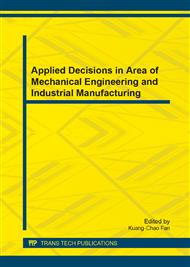p.346
p.350
p.354
p.359
p.364
p.368
p.372
p.378
p.382
Simulation Research of Asynchronous Motor Direct Torque Control System Based on MATLAB
Abstract:
Compared with vector control, direct torque control (DTC) spurned coupling idea and canceled circumgyration coordinates transform. By detecting motor’s stator voltage and current, along with calculating motor’s flux and torque in virtue of the instantaneous space vector theory, DTC controlled flux and torque directly according to the difference between the detecting value and design value. DTC also reduced calculation amount and overcomed the flaw that the system was disturbed by motor’s parameters easily, which were the problems in the vector control. On the basis approach mentioned above, this paper realized the system simulation using DTC. Simulation shows that asynchronous motor control has favorable ability of speed adjusting, short startup time, excellent stability.
Info:
Periodical:
Pages:
364-367
DOI:
Citation:
Online since:
July 2014
Authors:
Keywords:
Price:
Сopyright:
© 2014 Trans Tech Publications Ltd. All Rights Reserved
Share:
Citation:


